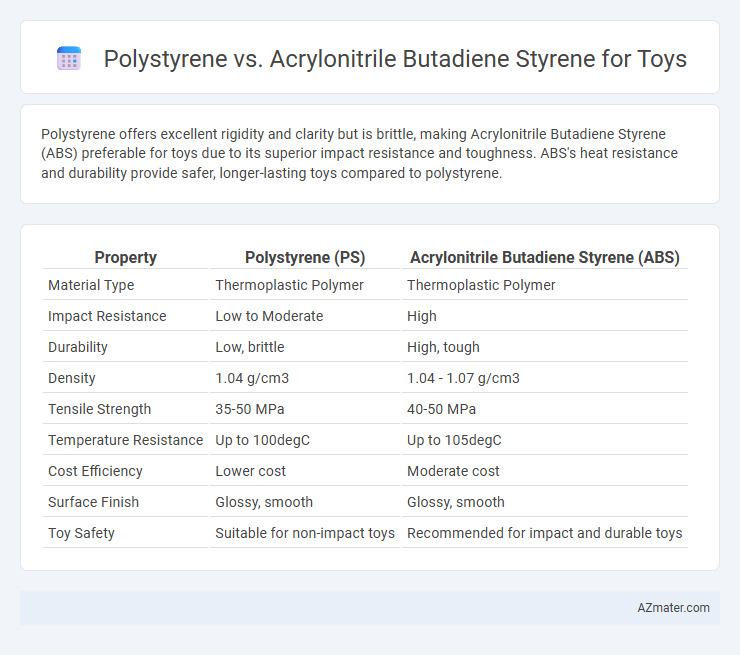Polystyrene offers excellent rigidity and clarity but is brittle, making Acrylonitrile Butadiene Styrene (ABS) preferable for toys due to its superior impact resistance and toughness. ABS's heat resistance and durability provide safer, longer-lasting toys compared to polystyrene.
Table of Comparison
| Property | Polystyrene (PS) | Acrylonitrile Butadiene Styrene (ABS) |
|---|---|---|
| Material Type | Thermoplastic Polymer | Thermoplastic Polymer |
| Impact Resistance | Low to Moderate | High |
| Durability | Low, brittle | High, tough |
| Density | 1.04 g/cm3 | 1.04 - 1.07 g/cm3 |
| Tensile Strength | 35-50 MPa | 40-50 MPa |
| Temperature Resistance | Up to 100degC | Up to 105degC |
| Cost Efficiency | Lower cost | Moderate cost |
| Surface Finish | Glossy, smooth | Glossy, smooth |
| Toy Safety | Suitable for non-impact toys | Recommended for impact and durable toys |
Introduction to Toy Manufacturing Materials
Polystyrene offers lightweight properties and excellent moldability, making it a popular choice for inexpensive, rigid toy parts with high detail precision. Acrylonitrile Butadiene Styrene (ABS) provides superior impact resistance, toughness, and durability, essential for toys subjected to rough handling and repeated use. Selecting between polystyrene and ABS depends on the required balance of cost, strength, and safety standards in toy manufacturing.
What is Polystyrene?
Polystyrene is a versatile thermoplastic polymer widely used in toy manufacturing due to its rigidity, ease of molding, and cost-effectiveness. It offers excellent clarity and surface finish, making it ideal for detailed and colorful toy components. Compared to Acrylonitrile Butadiene Styrene (ABS), polystyrene is more brittle but provides better precision in complex shapes and is less expensive for mass production.
What is Acrylonitrile Butadiene Styrene (ABS)?
Acrylonitrile Butadiene Styrene (ABS) is a thermoplastic polymer known for its impact resistance, toughness, and stability, making it ideal for durable toys. Compared to Polystyrene, ABS offers superior strength and heat resistance, which enhances the longevity and safety of toy products. Its ability to withstand rough handling without cracking or deforming makes ABS a preferred material in high-quality toy manufacturing.
Mechanical Properties Comparison
Polystyrene offers high rigidity and good impact resistance, making it suitable for detailed toy components, while Acrylonitrile Butadiene Styrene (ABS) provides superior toughness, higher impact strength, and greater durability under stress. ABS exhibits enhanced tensile strength and better resistance to deformation, making it ideal for toys requiring robustness and long-term use. The mechanical advantages of ABS over polystyrene translate into improved safety and reliability for children's toys subjected to rough handling.
Safety Considerations for Children’s Toys
Polystyrene (PS) is lightweight and inexpensive but poses safety concerns due to its brittleness and potential to break into sharp pieces, increasing choking hazards for children. Acrylonitrile Butadiene Styrene (ABS) offers superior impact resistance and durability, making it safer for toys that undergo rough handling. ABS is also less likely to release harmful chemicals under normal use, aligning with stringent safety standards for children's products.
Durability and Longevity in Toys
Polystyrene offers a lightweight and cost-effective option for toys but lacks the impact resistance essential for long-lasting durability. Acrylonitrile Butadiene Styrene (ABS) is highly valued in toy manufacturing due to its superior toughness, impact resistance, and resilience against wear and tear. Consequently, ABS ensures prolonged longevity and maintains structural integrity in toys subjected to frequent handling and rough play environments.
Design Flexibility and Ease of Molding
Polystyrene offers excellent design flexibility due to its rigidity and ability to hold intricate details, making it ideal for toys requiring sharp edges and smooth surfaces. Acrylonitrile Butadiene Styrene (ABS) excels in ease of molding with its higher impact resistance and heat durability, allowing for more complex shapes and durable toy construction. The choice between polystyrene and ABS depends on the desired balance between precision in detail and the toughness of the final toy product.
Environmental Impact and Sustainability
Polystyrene (PS) presents significant environmental challenges due to its non-biodegradable nature and difficulty in recycling, often contributing to landfill waste and marine pollution. Acrylonitrile Butadiene Styrene (ABS) offers better environmental performance, as it is more durable, recyclable, and results in less frequent replacement of toys, reducing overall material consumption. Choosing ABS for toys enhances sustainability by supporting circular economy practices and minimizing ecological footprint through improved end-of-life management.
Cost Analysis: Polystyrene vs ABS
Polystyrene (PS) generally offers a lower raw material cost compared to Acrylonitrile Butadiene Styrene (ABS), making it a more budget-friendly option for toy manufacturing. ABS provides superior impact resistance and durability, which can justify its higher cost in applications where toy longevity and safety are critical. Evaluating the total cost of ownership, including material price, processing expenses, and performance benefits, is crucial for making an informed decision between PS and ABS in toy production.
Which Material is Best for Toys?
Polystyrene offers rigidity and excellent surface finish, making it ideal for detailed toy parts, but it lacks impact resistance compared to Acrylonitrile Butadiene Styrene (ABS), which provides superior toughness and durability for active play. ABS's combination of impact resistance, heat resistance, and ease of molding makes it the preferred choice for toys requiring strength and safety compliance. For toys designed to withstand rough handling and long-term use, ABS outperforms polystyrene in both performance and child safety standards.

Infographic: Polystyrene vs Acrylonitrile Butadiene Styrene for Toy
 azmater.com
azmater.com